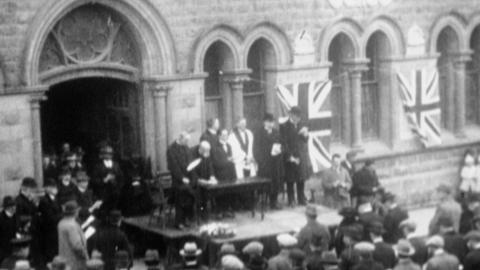National Screen and Sound Archive of Wales preserves and celebrates the sound and moving image heritage of Wales, making it accessible to a wide range of users for enjoyment and learning. Its film collection reflects every aspect of the nation’s social, cultural and working life across the 20th century, giving a fascinating insight into Welsh filmmaking, both amateur and professional.
This film is part of Free

Unveiling of 1914-1918 War Roll of Honour at Holywell, c. 1919
Flintshire lost hundreds of men on the WW1 battlefields, Holywell contributing 32 who are commemorated on the Roll of Honour plaques on the Town Hall, seen here being unveiled.
From the collection of:

Overview
Flintshire supplied hundreds of men for active service at the outbreak of WWI, men who worked in the local coal, copper and textile industries. 32 men from Holywell left but never returned and are commemorated on Roll of Honour plaques on the Town Hall which are seen here being unveiled. The man who draws off the covering Union Jacks appears to be overcome with emotion – he pauses and wipes his eyes before he can deliver his speech.
Wilfred Owen’s poem ‘Dulce Et Decorum Est’ was published in 1920, after the poet’s death in France and those passing by the Flintshire Roll of Honour may have wondered if the line by Horace, on which Owen based his poem, was indeed an “old lie”, as Owen believed. ‘Dulce et decorum est pro patria mori’ – it is sweet and fitting to die for one’s country.
Related

Funeral at the Front Funeral at the Front
Non-Fiction 1915 1 mins Silent
Sombre and moving World War I newsreel story.

Armistice Armistice
Musical 1929 16 mins
Take your seat for an Armistice concert by military bands playing a medley of songs commonly sung during WWI.

Remembrance Day in Dunham Massey Remembrance Day in Dunham Massey
Amateur film 1979 3 mins Silent Location: Dunham Massey Hall
Remembrance Sunday commemorations in Cheshire.

Rotherham Services Procession Rotherham Services Procession
Non-Fiction 1942 9 mins Silent Location: Rotherham
This is an absorbing film of a Remembrance Day service and procession in Rotherham, unusual in being held in wartime, and made more poignant for being so.

Armistice Day Poppies Armistice Day Poppies
Non-Fiction 1928 0 mins Silent
Newsreel tribute to the WWI fallen on the 10th anniversary of the war's end.

Preston and District Roll of Honour, 6th, 7th, 5th Series Preston and District Roll of Honour, 6th, 7th, 5th Series
Non-Fiction 1915 14 mins Silent
A rare surviving WWI memorial film, featuring poignant images of men killed or injured serving in the armed forces.

Queen's Jubilee - Holywell, 1977 Queen's Jubilee - Holywell, 1977
Home movie 1977 4 mins Silent Location: Holywell/Treffynnon
“E II R Rules OK” is the red, white and blue message on a Chopper entered in the silver jubilee best-dressed bike competition in Holywell.

Victorian Fair - Holywell, 1984 Victorian Fair - Holywell, 1984
Home movie 1984 4 mins Silent Location: Holywell/Treffynnon
The people of Holywell become Victorian ladies and gents for a day and mind the rolling barrels!

Holywell streets and Bala Sailing Club Holywell streets and Bala Sailing Club
Home movie 1970 3 mins Silent Location: Holywell/Treffynnon
Wicker baskets are the main carriers of choice for most of Saturday's shoppers in Holywell, and dinghies are used for racing on Bala Lake.

All We Imagine As Light - Exclusive Q&A All We Imagine As Light - Exclusive Q&A
Short interview 2025 28 mins
Payal Kapadia discusses her Cannes prize-winning and Bafta-nominated drama with Ashanti Omkar.

Khichdi Khichdi
Animation & Artists Moving Image 2023 16 mins
The interwoven stories of four best friends who reunite in the UK, thirty-five years after training together as nurses during their teens in Ferozepur, Punjab.

Dr XYZ: A Medical Drag Transthology Dr XYZ: A Medical Drag Transthology
Documentary 2023 15 mins
A satirical take on the healthcare service announcements of the 1960s and 70s.

Every Moment Counts Every Moment Counts
Animation & Artists Moving Image 2023 9 mins
A short animation that offers a window into the world of children’s palliative care.

Police Story: Panel Discussion Police Story: Panel Discussion
Inside Film 2024 24 mins
Panel discussion on Jackie Chan's 1985 action classic Police Story, with Chase Armitage, Sam Mak and Jadey Duffield.

China O'Brien: The Reunion China O'Brien: The Reunion
Documentary 2024 60 mins
Cynthia Rothrock, Richard Norton and Keith Cooke reunite three decades on from the groundbreaking martial arts classic.